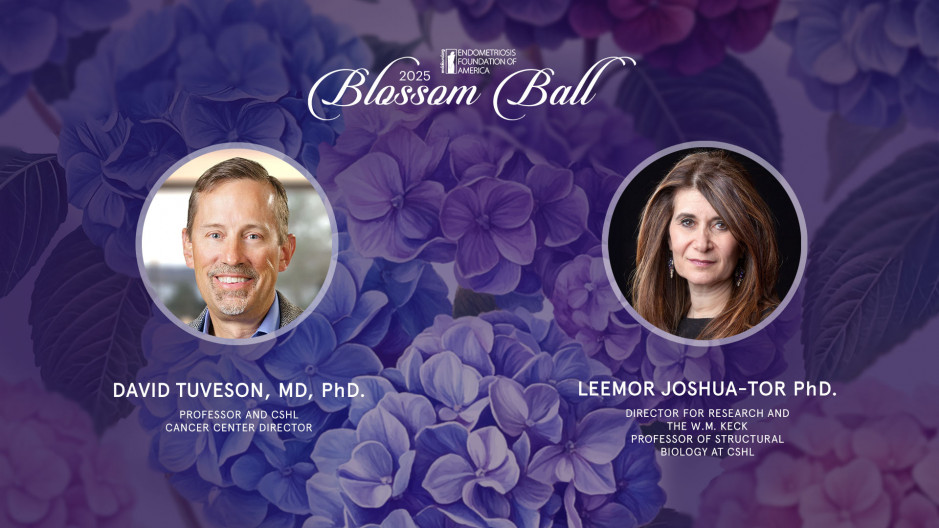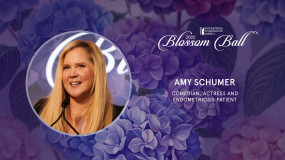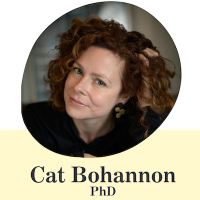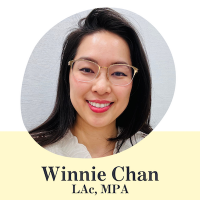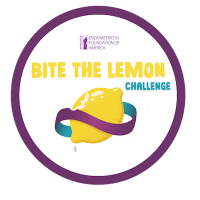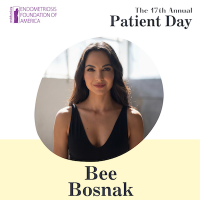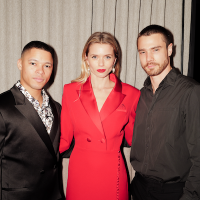Blossom Ball 2025 - Endometriosis Foundation of America
May 15, 2025
Pierre Hotel in New York City
Leemor Joshua-Tor, PhD. & David Tuveson, MD, PhD.
Thank you for watching. As you just saw, the launch of the Seckin Endometriosis Research Center marks a historic leap forward for women's health. The $20 million Initiative, one of the largest private investments in endometriosis research, reflects a powerful shared commitment to making endometriosis a national research priority. Dr. Leemore, Joshua Torre, and Dr. David Tuveson represent two of the key pillars that make Cold Spring Harbor Laboratories such a powerful partner. In this mission, Dr. Joshua oversees all basic science research at the lab, a critical area for research for endometriosis, where so much foundational biology remains to be decoded. Dr. Tuveson leads the cancer center called Spring Harbor, underscoring the lab's unique ability, not only to make groundbreaking discoveries, but also to translate them into real-world clinical impact. Together, their leadership reflects the full spectrum of what Cold Spring Harbor brings to this partnership: deep scientific excellence and a proven path to changing standards for care. We're honored to welcome Dr. Lee Moore, Joshua Tore, and Dr. David Teon from Cold Spring Harbor Laboratory. They're here to share more about this transformative partnership and its potential to shape the future of women's health science. Please join me in welcoming them.
Leemor Joshua-Tor
Hi everybody. My name is Leemor Joshua-Tor. I'm the research director at Coleman Harbor Laboratory, and I want to thank you for this wonderful invitation. We are so excited about this new center at Cold Spring Harbor Laboratory. I also want to thank you for not scheduling me directly after Amy Schumer.
Cold Spring Harbor Laboratory. As you saw, it's a beautiful and magical place. It's on the North Shore of Long Island, about 30 to 35 miles from here. It's right on the border between Nassau and Suffolk counties. We've been there for 135 years now, and our strength is in investigating the mysteries of biology. We do genetics. We work on cancer, we work in neuroscience, plant biology, and quantitative biology. We now use neuroscience to study AI. We use AI to study neuroscience. We are really trying to make connections now in different systems of the body to understand biology, so we do not study the brain separately, the immune system separately, and cancer separately. But we want to understand the connections between the brain, the immune system, and cancer. And so Dr. Samir Baez, who is heading this new center, is part of this initiative to understand the mechanisms of our body and to be able to translate that into treatments, then and hopefully even cures down the road.
When we opened the center, I mentioned a report I reread recently. President Roosevelt, towards the end of World War II, approached Dr. Vannevar Bush to ask him how science could enhance the safety, health, and economy of the United States. And he told him that he understood that science is a powerful tool, not only because of the Manhattan Project that you're all familiar with, but also, for example, the development of antibiotics and medications that helped the war effort, and technologies that helped the war effort. Dr. Bush almost exactly 80 years ago presented his report to the president of the United States and said that what we need is a partnership between the federal government, the taxpayer universities, and philanthropy, and that's really going to strengthen our economy, our wellbeing, and our health technology. And so he understood that letting scientists pursue their curiosity in a free and uninhibited way would propel these discoveries and enhance our economy and wellbeing. And he was more than right. He was right. It really turned out that having this partnership between these three entities, the federal government, the taxpayer, the universities, and philanthropy together brought the United States into the powerhouse of inventions, technology, and healthcare that leads the world, and we really should not lose sight of it. We need to keep this kind of partnership and this center, the Kin Center for Anywhere address. This research is an example of these coming together, leading to therapeutics.
We have been working in this kind of area of fundamental basic research, and then seeing opportunities to develop things that would go into the clinic and improve our well-being. So one of the premier people leading the way for Cosman Harbor to do this, especially in the area of cancer, is the director of our cancer center, Dr. David Tuveson.
David Tuveson, MD, PhD.
Thank you, Leemor, and good evening, everybody. It's a bittersweet moment because we're all coming together in a beautiful place, having an amazingly delicious meal to celebrate, and launching a science center on a topic devastating to 10 to 20% of all women. So it's again, a sobering moment. This is a disease that causes pain and suffering. Infertility and death have a lot of similarities. The cancer spreads. It's not cancer, but it acts like it and makes you feel like you have it. I work on pancreas cancer, and I was around when we started the first Pancreas Cancer Foundation 25 years ago. It was kind of similar to this. People came together; they wanted to do something better than what we had. We talked about it. We raised some money; we started some centers. A lot has happened since then in my field. We now have hope for patients that had no hope in the past, and I could see the same happening in this field if you concentrate, if you invest in the people who will be committed to bringing it forward.
So I got to meet Dr. Schein, who has a magical role in this disease. I trained as a medic, physician, and scientist, so I got to meet a few of the folks over the last 35 years. He has a talent. He brings people into this field and cures many of you in this room. It's great that he's applying his talents to starting this foundation with Pariah to combat this disease. And so, as Professor Moore, Joshua Torah explained, Cold Spring Harbor is a think tank and an independent research institution. We study the mystery of life biology, but we also work on protecting it when threatened, fixing it when broken. And endometriosis has now become one of our tasks in pancreatic cancer. My job is to put myself out of business, and I'm still here, so I'm failing.
But Samir's job is to put himself out of business in endometriosis research, and that's what this center allows him to do. So your support tonight is a big deal. It allows Pariah to get to that next level. She just took the job from Dr. Kin to be the foundation's next leader. So she's going to need your support because she's going to want to start other centers. She's going to want to have other brain trusts actually to make this work. That's what I did with the Les Garden Foundation. I employed people at Harvard, Hopkins, Salk Institute, and elsewhere, bringing in more brains to solve these problems. If we think we're moving to Mars, we'd better get healthy soon. And that's what we're doing tonight. So thank you again for all of your support.



